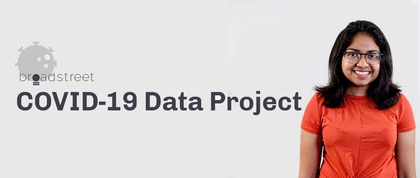
A perspective piece by Undergraduate Student Tasfia Bashar
Pictured: The BroadStreet Health COVID-19 Data Project logo and Tasfia Bashar
Shortly after the COVID-19 virus reached New York City, I found out about BroadStreet Health’s COVID-19 Data Project through our very own Public Health Post. It was a stressful time: my local hospital was constantly on national television as a symbol of NYC being the epicenter of the COVID-19 pandemic. As a GPH student, I felt like I should be doing something to help, but I didn’t know where exactly to start.
BroadStreet, however, provided that opportunity. The training I have received through my public health classes made me confident that the internship was a good fit for me and that I could offer a unique, thoughtful perspective. My sophomore status and lack of prior internship experience outside of NYU was not a disadvantage because the BroadStreet experience is designed primarily as a data collection internship with opportunities to develop further skills according to your interests.
The Project began as the development of a dataset of COVID-19 cases and mortalities nationwide, differing from similar datasets in that these counts were determined manually. The training week, at the time, involved delving into archival news footage and health department sources to determine case and mortality counts (rather than using AI) prior to March.
I expected to continue doing this type of work throughout the rest of the internship. Instead, my trajectory changed completely when CEO and co-founder Tracy Flood recognized my interest in leadership and policy and asked me if I’d like to become a Policy Team Lead!
Serving as a Policy Team Lead, I led a team of around 10 members in weekly meetings on Sunday afternoons. We started off by comparing how accessible information was on states’ and counties’ COVID-19 dashboards. Then, we moved on to a policy surveillance collaboration with Temple University in which we analyzed states’ executive orders to record what restrictions they were enacting.
Pictured: Example of questions used to categorize the COVID-19 policy response in New York state.
Being a leader necessitates flexibility and open-mindedness, but in the midst of a pandemic, this proves to be especially true. After all, when so much is in flux, people’s circumstances can suddenly change and prevent them from being available. I’ve always considered myself an empathetic person, yet I was still pleasantly surprised to see how this experience played out in this new situation. For the first time in my life, I was leading a group of people outside of an academic setting, consisting of people in different time zones across the country, including some who were older and further along in their professional endeavors.
I genuinely enjoyed getting to know my own teammates and promoting a sense of team solidarity despite socially distant times, and I wanted everyone else in this internship to be able to experience that as well. With this in mind, I pitched the idea of an Internal Connectivity program to Tracy (which I would go on to lead), and I also founded the first official “club” at BroadStreet for members of the NYU community participating in the internship. I pioneered the utilization of LinkedIn as a way of showcasing interns’ achievements and staying connected with each other even after graduating from the program. This, in turn, helped heighten the visibility of the work we were doing.
I will always be grateful for the opportunity to have had such an influential role in shaping the COVID-19 Data Project as new opportunities and challenges arose. By getting involved when I did, there was tremendous room for personal growth. Working with a startup in the midst of a public health emergency showed me that in the real world, it’s rare to follow a linear path in devising solutions. There is constant restrategizing and circling back because you never know if something will work out as intended. As a result, this experience has made me a better, more adaptive leader. I hope to pursue a career in health policy or management one day, and I know that my time at BroadStreet has brought me closer to making that happen.
Pictured: BroadStreet map depicting total confirmed COVID-19 cases and deaths in parts of the Northeast